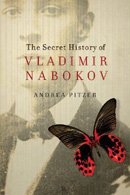Was Véra Nabokov’s sister a spy?
When the Nabokovs came to America in 1940, they sailed through immigration, pausing only to struggle with a locked trunk that needed to be inspected by customs. But arrival in a new country was less simple for thousands of other refugees fleeing Europe during World War II, including Véra Nabokov’s younger sister Sonia. Making her […]
Isaac Babel and Vladimir Nabokov
Russian author Isaac Babel is reported to have said of his literary contemporary Vladimir Nabokov that “he can write, but he’s got nothing to say.” Early in his career, Babel wrote a short story just three pages long called “Line and Color.” This story goes to the heart of the tension between invention and reality in […]
Hiding history in fiction: Nabokov’s Proustian wink
Tomorrow The Secret History will be published! I’m headed up to New York to do my first interview for the book. But before it drops, I wanted post a quick note on something important. I’ve spent the last five years exploring the links between Nabokov’s fiction and the world in which he lived. There’s a […]
The mysteries of Zembla
So much fiction relies on what’s missing from a story, the details an author fails to or chooses not to include. In the spirit of just such incomplete information, Vladimir Nabokov’s 1962 novel Pale Fire delivers that most unreliable of narrators, the mad Charles Kinbote, who obsesses over ping-pong, young boys, and his beloved country […]
Nabokov as digital prophet and Pale Fire as hypertext
Born in the nineteenth century, was literary alchemist Vladimir Nabokov also a digital pioneer for our electronic era? Nabokov’s description of a primordial emoticon from 1969 (“I often think there should exist a special typographical sign for a smile—some sort of concave mark, a supine round bracket”*) gets new coverage each decade from those chronicling […]
Pnin, the Cremona Women’s Club, and Jewish refugees after the war
Nabokov was crazy for complex allusions, intentionally seeding his fiction with literary and historical references, from pop culture and epic poetry to both in a single line (see “Chapman’s Homer” from Pale Fire). But there are so many winks and nods and proper names in his books, sorting out what has coherence from what is […]
